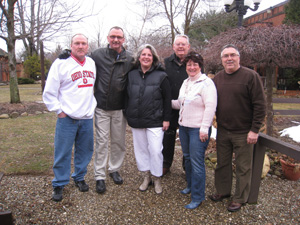 |
Courts, Jail, Prison,
and Re-Entry
Part One
Affinity Group Stories
by Scott Myers
|
For over four years now we have been telling stories about individual organizations working to make the Akron area a better place. You can see them by following the Archives link in our menu bar.
We have allbenefited, even if not directly, from the work of these groups. We hope you feelbenefited by reading their stories each week.
Do you remember the story about Ministry Impact, held last October?
Their theme is
Unite + Connect + Equip = Impact.
This aligns with the Akron area eutopia Report's mission, they and we have the same goals.
- We want to find where people are working together to build up Good Places.
- We want to tell their stories.
- We hope that people read these stories and find where they can help out.
- Wherever we are engaged to build up a Good Place, we also benefit by knowing who else is working around us,
even if we do different things. We can support and even partner with people who build up Good Places in different
areas than we do.
In addition to stories of individual organizations we will begin posting stories of the areas that groups of organizations work in together. For lack of a better term we call these Affinity Groups. This week we are starting with the Affinity Group involved with courts and the correction system.
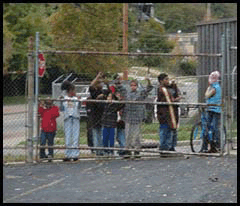 |
Kids in Akron |
Trapped in the Legal System
When a child is born everyone hopes he or she will be healthy, grow up to do well in school, find what they are good at, find work that makes use of their talents, maybe get married and have their own kids, then hope that their kids will be healthy, and on and on.
Some people never make it into that cycle.
So many of our stories are about organizations that help people find or return to healthy lives.
Some people get so far beyond healthy or safe living that they end up in the courts and correction system.
Most of us know very little about this system.
For some people it has become their whole world, seemingly with no way out.
What is that world like? Who is working to make that part of our world a Good Place? What can we do to help them?
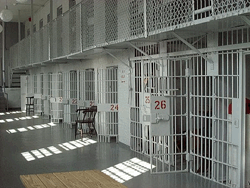 |
Jail bars |
Jail is not Prison
We have posted individual stories on The Way Out, Broken Chains, and True North jail ministries over recent years. Earlier this year we joined them as they met to coordinate their efforts, so that we could get an overview of the state of Jail Ministry in Summit County.
First we learned the difference between Jail and Prison.
A city or county runs a Jail. The state runs the prisons.
"There are no prisons in Summit County. Through the jail and half way houses we have far more opportunity to influence." said Bill Wilder of The Way Out.
"There are actually 32 penitentiaries in the state." said Dennis Shawhan from Broken Chains.
John Wiseman, also from Broken Chains added, "That's an incredible number. When I started doing prisons in 1982, there were like 10. We covered them all. We covered almost every prison in the state of ohio on a yearly basis."
Broken Chains and The Way out focus on the Summit County Jail rather than on the state Prisons.
Again, John Wiseman: "One of the conclusions we've come to is, for us, Summit County Jail has become our flagship jail. We have 700 inmates in there on any given day. So we don't need to do so much with prison ministry because we've got our hands full."
Many of the prisoners in jail go on to prison, but then come back to the jail prior to being released at the end of their sentences.
"Sometimes they go to prison and then in some cases they can come back on a judicial release or an early release. So the contact that we made with them in Christ before they go to prison holds bearing for them while they're in prison. They come back and say 'Hey I'm back back.' Then we work on their re-entry." said Wiseman.
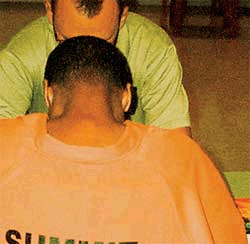 |
Chaplain and inmate |
Chaplains and Volunteers
How do these ministries operate and what exactly do they do?
Shawhan, Wilder and Wiseman are each registered Chaplains with the jail, a standing that gives them privileges and access in the jail that other volunteers don't have.
"Chaplains are given a badge and have full access 24/7, 365. We can go into the jail anytime we want to.
"Then we have volunteers. Bill has a list of volunteers who do the chapel services. They must be escorted and there are only certain hours they can come in. They come in under one of the chaplains," said Wiseman.
"There's an inmate service supervisor who coordinates all volunteers who come into the jail. We have 6 male chaplains, 3 female," Shawhan added.
In the recent past the Chaplains would sponsor church services and Bible studies in the Jail led by different churches in the area.
"There were ten or eleven local churches under each of our umbrellas that went in on a rotational basis and there were 3 services on a Sunday night for men and 2 for women for years. So we had close to 400 inmates in services every Sunday night," said Wiseman.
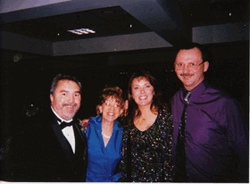 |
John Wisemam and Dennis Shawhan |
Effects of the Recession
Volunteers must be accompanied by Deputy Sheriffs. Due to the recession and layoffs at the Jail, though, there are no longer enough Deputies to accompany volunteers for church services or Bible studies.
"When the layoffs happened that went by the wayside, all the churches are gone," said Shawhan.
"Like, over night it was gone." said Wiseman.
"All weekend and weekday evening activities were cut off. All they had was 9-5, office hours," Wilder added.
"There's no longer any recreation, no gym, no library, no AA (Alcoholics Anonymous), no NA (Narcotics Anonymous), no chapel services," Shawhan continued. "We still have what they call a religious time and we can do what we want with that time and each one is assigned a different unit. Like ours is Friday morning from 9:30-11, we can either have a bible study or chapel service and we chose to do the chapel services to model the local church. So instead of there being a conglomeration of 90-100 men at one time and 30-35 women at one time, there's 20 in a classroom setting."
The jail has 6 units, called Blocks, five for men and one for women.
"Each of us gets one Block one day a week," said Wilder. "One thing that has continued is that the designated Chaplains are allowed to do one-on-one visits. That hasn't been affected."
Even with the current restrictions, Broken Chains and The Way Out jail ministries have found creative ways to meet the spiritual needs of incarcerated men and women. Our next story in this series will investigate some of the creative ways they are responding to this new challenge.
To read Part Two of the story click the link.
If you have any story ideas, questions, or comments you can contact: Katie@akroneur.com.